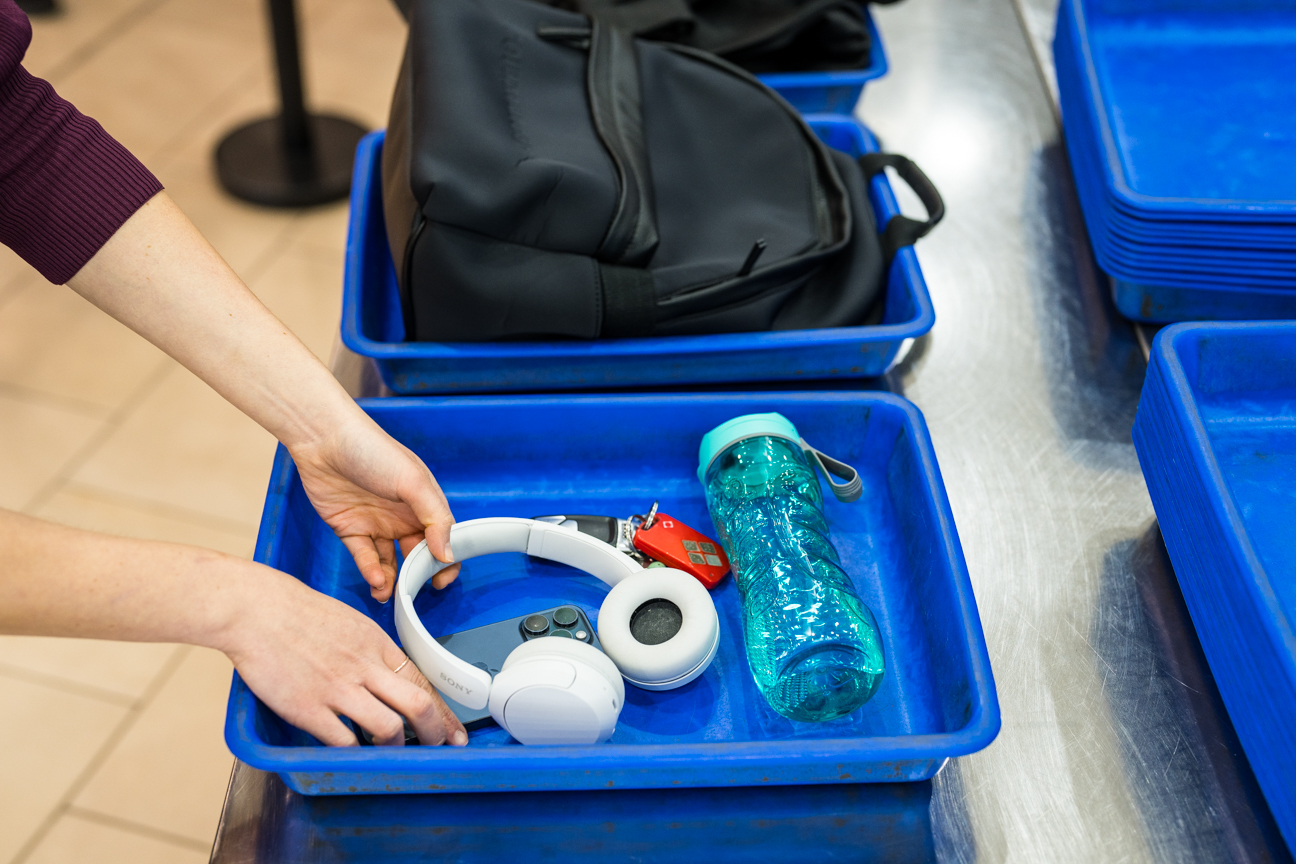Security policies and procedures are updated frequently, so please take time to view the information below.
Security screening
Australian Government regulations specify that everyone, including passengers, aircrew and airport workers, must go through a security screening point at Hobart Airport’s Domestic and International Terminals before boarding a flight or moving into secure areas of terminals.
Our focus is to provide efficient screening processes that show respect for all passengers, while at the same time assuring the highest level of security standards are maintained.
You are responsible for keeping track of your own possessions when you pass through the screening point. We suggest that you put your valuables, such as wallet, passport, jewellery and camera, in your bag before arriving at the screening point.
If walk-through detector alarms go off during screening, passengers will be subject to further screening before being cleared for travel. This may include the removal of various outer garments, including headwear or footwear, which can have a metal brace in the instep that activates alarms. If alarms continue to sound passengers may be asked to undergo a physical search.
If, for religious or other personal reasons, passengers do not wish to undergo these screening processes in public, they may request that screening occurs in a private room.
Explosive Trace Detection machines are in use at Hobart Airport. Passengers and baggage may be tested at check-in or screening points at any time.
International travel requirements
Additional screening requirements will apply to travellers flying to Auckland direct from Hobart. Please check with your airline about what you can and can’t take on an international flight.
Passengers with special needs
Passengers or visitors with special needs may require a private security screening. This may take more time and should be factored into planning ahead of your flight. If you have any questions or concerns, please speak with one of our friendly screening officers.
Medical implants
Medical implants may be affected by the security screening procedure. Please inform the screening officer if you have any implants (such as pacemakers or cochlear implants) to request a separate screening.
Artificial limbs/prostheses
If you have artificial limbs/prostheses, please inform the screening officer to request a separate screening.
Walking aids
Walking aids must be screened and as such may require X-Ray or Explosive Trace Detection. There are chairs and walking aids available at the screening point for you to use whilst your walking aids are screened.
Additional assistance and wheelchairs
Our staff are very experienced in moving passengers who require additional assistance and will take passengers directly to the security screening point. Passengers in wheel chairs will be required to undergo screening by way of a pat-down search by a security officer of the same sex.
Passenger drop-off
Australian Government security requirements dictate that vehicles dropping off passengers at the front of the terminal must be attended at all times. The driver of the vehicle must remain with their vehicle.
Any vehicle left unattended will be subject to an immediate fine and may be towed away.
Visitors to the Airport are encouraged to use the car parking options available if they wish to enter the terminal to greet or farewell passengers. Our Long Term and Saver Car Parks also have a 15-minute free period if you wish to take advantage of this option.
Closed Circuit Television Monitoring (CCTV)
Closed Circuit Television (CCTV) operates at Hobart Airport as part of an ongoing Aviation Security initiative, targeting crime and aviation security related issues.
CCTV significantly increases the ability to monitor areas of the airport and immediately act on any unlawful activity. This increases the safety of passengers, visitors to the airport and employees.
Unattended baggage
Baggage must never be left unattended in public areas. All such baggage will be treated as suspicious. All belongings should be clearly tagged with your contact details and your destination displayed on the outside. Airlines supply luggage tags for this purpose and are available at the check-in counters. Ensure that you pack your own bags and never take items on board an aircraft for other people.
Security related threats
Passengers and airport visitors are warned that all threats and comments made about the carrying of weapons or explosives – whether intended as a joke or not – will be taken seriously and may result in refusal of carriage onto the flight and prosecution by law enforcement.
Dangerous goods
Please ensure you do not carry any flammable liquids, gases or other dangerous goods with you or in your luggage.
These items are not permitted on the aircraft as they are capable of posing a significant risk to health and safety when transported by air. Such items will be removed by security staff when detected.
Further information on dangerous goods can be found by downloading the CASA Dangerous Goods app.
Prohibited items in hand luggage
Bladed implements such as knives and tools, blunt items that could be used for bludgeoning, household flammable goods and items that could be used to restrain someone are prohibited in hand luggage. For an up to date list of prohibited items please follow the link below.
If these items are not surrendered at the screening points the passenger is in breach of Australian Government regulations and the airline will not allow the passenger to travel. Please ensure no items are in your hand luggage before reaching the screening point otherwise detection of these items at screening points will require you to surrender these.

